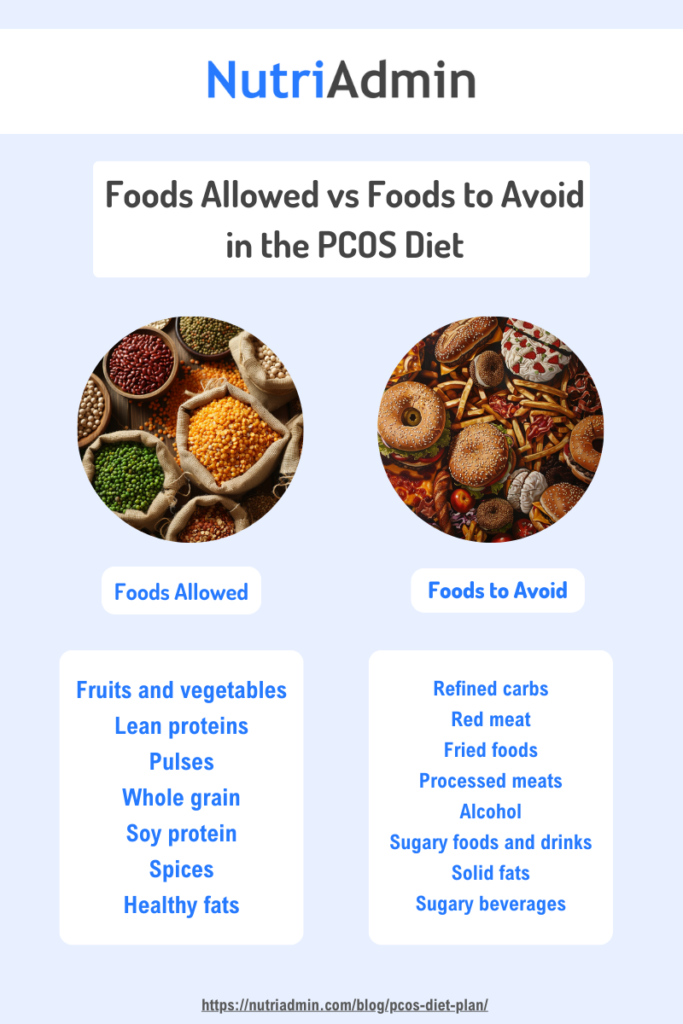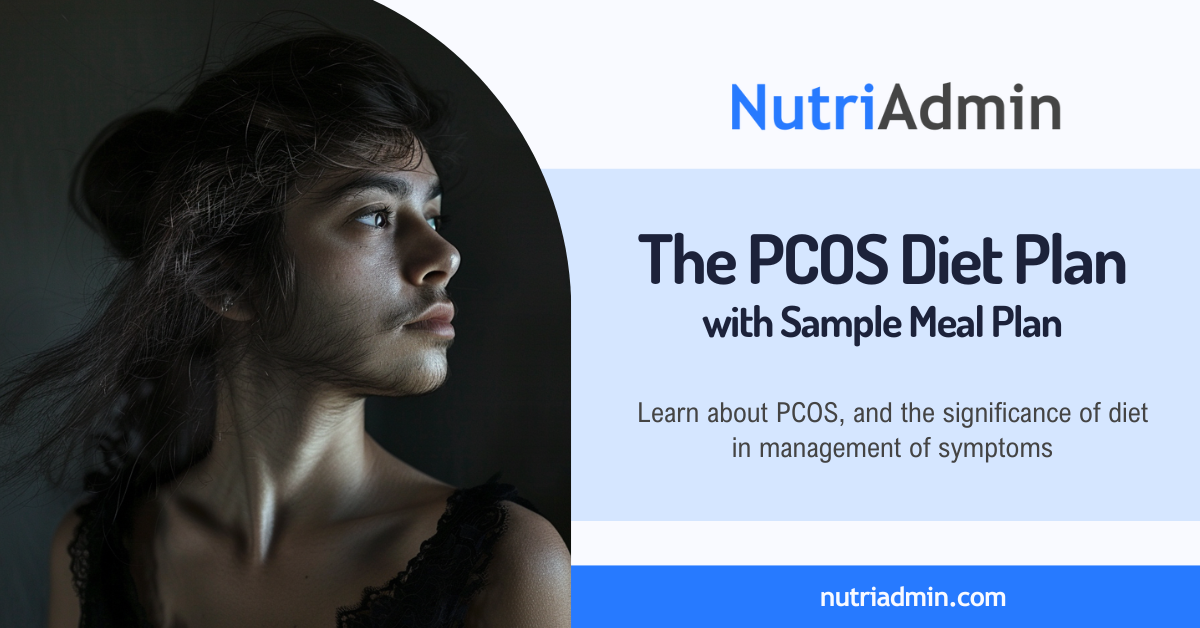PCOS Diet plans have become very popular recently. But what does research say about them? Are they effective? What exactly do we mean when we say PCOS meal plans? What is PCOS? And is it worth all the hype that surrounds it?
Read on to find out!
What is PCOS?
PCOS stands for Polycystic Ovary Syndrome, a condition in which women’s ovaries produce an abnormally high amount of androgens (male sex hormones). Usually, women produce Androgens, but in minute quantities. In PCOS, these hormones become elevated.
PCOS is a hormonal condition that is common among women of reproductive age. It is prevalent in this age group, with about 8-13% of women diagnosed with this condition. Another 70% of PCOS cases go undiagnosed.
PCOS is significant as it affects the quality of life of affected women. For instance, it is one of the leading causes of infertility and may also lead to several biological and psychological effects such as obesity, infertility, body image, and social stigma.
- What is PCOS?
- What causes PCOS?
- What are the symptoms of PCOS?
- What are the stages of PCOS?
- How is PCOS Diagnosed?
- What is the PCOS Diet Plan?
- How Effective is the PCOS Diet Plan?
- Foods Allowed in the PCOS Diet Plan
- Foods to Avoid in the PCOS Diet Plan
- PCOS Meal Plans
- Other Methods for Management of PCOS
- Conclusion
- FAQs
What causes PCOS?
The exact cause of PCOS is yet to be determined. However, there seems to be a link between insulin levels and PCOS. Women with PCOS usually have insulin resistance, meaning their bodies are resistant to insulin’s action, which helps glucose uptake.
A study involving 463 patients diagnosed with PCOS has also linked PCOS and obesity. Furthermore, researchers demonstrated that the FTO gene, which is a high risk for obesity, is also linked with a significant susceptibility to PCOS.
Another risk factor of PCOS is genes. Some genes have been associated with the development of PCOS. While these genes do not cause the condition, their presence greatly increases the chances of developing PCOS.
The 4 major causes of the manifestations of PCOS are:
- Disorder of the production of gonadotropins
- Insulin resistance
- Impact of excess body fat
- Disorder of Metabolic pathways (e.g. Insulin, steroids)
What are the symptoms of PCOS?
Symptoms of PCOS are varied. Some of the common manifestations include:
Menstrual Anomalies
Women with PCOS usually have menstrual disorders. These disturbances typically begin when they start menstruating (menarche). These women may experience menstrual periods that are absent, inconsistent, or extremely light. Some women may also present with abnormal uterine bleeding.
Hyperandrogenism
Excess masculine hormones typically manifest as excess body hair with a masculine pattern of hair distribution on the chest, stomach, chin, upper lip, and back. There may also be acne.
In an extreme form of PCOS known as hyperthecosis, females may experience voice deepening, increased muscle mass, and clitoromegaly (enlargement of the clitoris).
Infertility
In any woman with PCOS, ovulation does not occur regularly, as in women without the condition. Hence conception can be difficult or take longer than in other women. There is also a higher rate of miscarriages among women with PCOS – from 30-50% compared to 10-15% of women without PCOS.
Obesity and Metabolic Syndrome
More than 50% of women with PCOS have a BMI greater than 30 (obesity), and there is usually a lot of belly fat (abdominal obesity). Moreover, they also have an increased risk of cardiovascular disorders than women without PCOS.
Want to know your BMI and see if you’re at risk? Enter your height and weight in our BMI Calculator.
Diabetes Mellitus
By the age of 40, more than 50% of women with PCOS develop DM. Recall that insulin resistance is a feature of PCOS that is also present in Type 2 DM.
Sleep Apnea
Sleep apnea refers to a disorder that causes breathing to cease during sleep.
Acanthosis Nigricans
Acanthosis nigricans refers to diffuse hyperpigmentation and thickening of the skin. Furthermore, it typically occurs around the axilla, nape of the neck, below the breasts, and intertriginous areas. It seems to result from insulin resistance.
Summarized Symptoms of PCOS
- Absent/Irregular/Very light periods
- Excess body hair with a male pattern of distribution
- Large ovaries with numerous cysts
- Acne or oily skin
- Alopecia/Male-pattern baldness
- Infertility
- Skin tags/Hyperpigmented skin on armpits, neck, under breasts
- Belly fat and weight gain
What are the stages of PCOS?
The stages of PCOS refer to the subcategories of PCOS. These subcategories are the phenotypes (subtypes) of the PCOS condition. The expression of PCOS may start early in life and evolve across the lifespan of the woman. According to the Rotterdam criteria, there are 4 possible diagnostic subcategories of Polycystic Ovarian Syndrome:
- Irregular menses/hyperandrogenism/PCO morphology
- Irregular menses/hyperandrogenism
- Hyperandrogenism/PCO morphology
- Irregular menses/PCO morphology
How is PCOS Diagnosed?
Since PCOS does not have an exact cause, healthcare professionals must observe several signs and symptoms along with investigations and tests to come to a diagnosis.
Some of the tests that doctors may request to make a diagnosis of PCOS include:
- Hormonal profile: Doctors may request this test to assess the levels of different hormones in the body, especially masculine hormones.
- Glucose and Insulin levels: An oral glucose tolerance test may be carried out. Women with PCOS before pregnancy should undergo an assessment for gestational diabetes before 20 weeks of pregnancy.
- Lipid Profile: The lipid profile in PCOS may be deranged, with elevated values of cholesterol and Low-Density Lipoprotein (LDL).
- Ultrasound: Ultrasound can visualize the ovaries and see if there are any cysts.
Physicians generally agree on the Rotterdam criteria to make a diagnosis of PCOS. It requires that at least 2 of the following should be present:
- Irregular or absent periods
- Hyperandrogenemia
- Ultrasound scan showing polycystic ovaries.
What is the PCOS Diet Plan?
There is no universal PCOS diet. However, researchers have agreed on an approach that seeks to limit the symptoms of PCOS and improve the quality of life.
The diet for PCOS would include:
Low Glycemic Index (LGI) Diet for the PCOS Diet Plan
A low glycemic index diet is a diet that elevates blood sugar slowly. The glycemic index is like a score of how much and how fast a food substance elevates the sugar levels.
Foods appropriate for PCOS must be low-glycemic index foods to prevent excess sugar in the blood. Recall that PCOS is insulin resistance is a feature of PCOS, that is, women with PCOS have difficulty producing enough Insulin to meet their daily needs. Therefore, if too much glucose and the insulin is insufficient, it could lead to hyperglycemia and other attendant complications.
Anti-inflammatory Diet for the PCOS Diet Plan
Women with PCOS should consume foods with anti-inflammatory properties. These foods can also help to reduce some of the symptoms that women with PCOS experience.
The DASH Diet for the PCOS Diet Plan
The Dietary Approach to Stop Hypertension (DASH diet) is primarily designed to treat hypertension. However, a study carried out in 2021 revealed that the DASH diet can also reduce insulin resistance, hyperandrogenism, and obesity. It also improved the appearance of the ovaries.
How Effective is the PCOS Diet Plan?
While there is no standard PCOS diet, the PCOS diet describes a combination of different diets to relieve the symptoms that women experience in PCOS.
One thing that is common to all the foods in these diets is that they promote the consumption of fresh, whole foods and discourage processed foods, added sugars, and fats.
There is no PCOS diet for pregnancy, PCOS diet for weight loss, or PCOS diet for ovulation, hirsutism, or other symptoms.
However, the PCOS diet plan reduces some of these symptoms of PCOS. For instance, there is some evidence that some of the components of the PCOS diet plan may significantly improve fertility outcomes. More specifically, the greatest improvements were in low-carbohydrate diets over a longer duration.
Since the diet plan restricts calorie intake and emphasizes eating frequent small portions over large portions and hydration, it can also significantly improve weight loss in PCOS. The PCOS diet plan also reduces inflammation, hyperandrogenism, and other anomalies in the condition.
With this knowledge, let us examine the foods allowed in the PCOS diet and those that should be avoided.
Foods Allowed in the PCOS Diet Plan
Some of the foods that are allowed in the PCOS diet include:
- Fruits and vegetables
- Lean proteins
- Pulses
- Whole grains
- Soy protein
- Spices
- Healthy fats (unsaturated fats)
You can also consult the figure below for a summary of which foods to eat and avoid in the PCOS diet.

Foods to Avoid in the PCOS Diet Plan
Some of the foods that are allowed in the PCOS diet include:
- Refined carbs
- Red meat
- Fried foods
- Processed meats
- Alcohol
- Sugary foods and drinks
- Solid fats
- Sugary beverages
PCOS Meal Plans
As mentioned earlier, PCOS has no one-size-fits-all diet. However, several diets can be modified to form a PCOS meal plan. You can manually create PCOS meal plans with your expertise as a nutritionist, coach, or dietician.
You can also explore using applications that can help speed up your workflow. There are so many software products out there that can generate PCOS meal plans, and NutriAdmin is one of the best meal plan generators at the moment. Here is a sample PCOS meal plan generated using NutriAdmin.
Other Methods for Management of PCOS
In addition to diet, several other methods can be used to ensure that PCOS is well-managed and that the individual’s quality of life is maintained.
Medical Management of PCOS
Doctors may ask women with PCOS to take different medications as part of the medical management of PCOS. Some of these pharmacologic agents can help to rectify metabolic derangements. They include:
- Oral contraceptives: Used in the management of menstrual anomalies.
- Metformin improves menstrual irregularities and glucose anomalies.
- Clomiphene is used to treat infertility
- Other drugs include spironolactone, prednisone, and leuprolide.
Lifestyle Modifications
According to the American College of Obstetricians and Gynecologists (ACOG), Lifestyle modifications, including weight loss, exercise, and diet, are among the first-line options for restoring ovulatory cycles and achieving pregnancy in women with PCOS.
When these are done consistently, they can reduce the risk of diabetes. Research has shown that the lifestyle approach is more effective than the medical management of PCOS.
Weight
Weight loss is one of the most effective ways to manage PCOS. In fact, studies have shown that a 5% reduction in body weight significantly improves symptoms. Again, weight loss also helps to reduce the risk of developing complications from excess weight, such as type 2 DM sleep apnea and hypertension.
Exercise
Numerous studies have demonstrated that exercise could improve the reproductive functions of women with PCOS. In addition, exercise can lead to a reduction in infertility and also alleviate social and psychological stress in women.
Furthermore, studies have also found that vigorous-intensity exercises may significantly impact cardiorespiratory fitness, body composition, and even insulin resistance. Therefore, experts recommend 120 minutes of vigorous-intensity exercises per week for maximal benefits.
Intermittent fasting for PCOS
Intermittent fasting refers to a type of eating plan that involves switching from eating to fasting in a regular pattern. There are different patterns of intermittent fasting. They include fasting for 12 hours in a day, 16 hours (16:8), fasting for 2 days a week (5:2), and alternate-day fasting.
Studies have shown that Intermittent fasting is beneficial to PCOS. A six-week study using the 16:8 method demonstrated that Intermittent fasting was effective in significantly reducing the BMI and weight of patients with PCOS. In this study, Intermittent fasting also improved the reproductive hormone levels, glucose, and lipid profiles. Therefore this makes intermittent fasting a viable option for first-line management of PCOS.
While this short-term study showed some positive results, researchers need to conduct further research to study the long-term effectiveness of intermittent fasting in PCOS.
Supplements for PCOS
Several studies have been able to demonstrate that complementary medications such as supplements have some significant positive effects on PCOS.
Studies show that these supplements effectively improve hormonal balance and menstrual regularity and also reduce the risk of PCOS in other populations. Here are some of these supplements:
Curcumin
Curcumin is a dietary supplement, a product of Turmeric (Curcuma longa). It is an antioxidant that mops up free radicals and regulates detoxification. It also acts to induce ovulation and improve the biochemical profile of women with PCOS.
Curcumin may also improve blood sugar control and lipid metabolism in patients with PCOS and metabolic abnormalities. However, further research would be needed to elucidate the benefits of Curcumin on other symptoms of PCOS.
Vitamin D
Vitamin D is a fat-soluble vitamin. It is crucial for calcium absorption and, subsequently, healthy bone formation. It is also needed for optimal immune function.
There is a link between Vitamin D deficiency and Metabolic syndrome features in PCOS. One study showed that 72.8% of women with PCOS had lower Vitamin D levels than women without PCOS. This implies that vitamin D deficiency may be responsible for some symptoms in PCOS.
Studies also suggest that Vitamin D improves reproductive and metabolic impairment in PCOS. Regular Vitamin D supplementation improves hormonal function, glycemic control, and insulin sensitivity in PCOS patients. Both high and low doses of Vitamin D confer benefits. However, some studies suggest that higher doses achieve better results.
Inositol
Inositol is a sugar manufactured in the body and found in food. It is abundant in the human brain, the kidney, and other tissues. Inositol is pivotal in enhancing the binding between several neurotransmitters and their receptors. Inositol has several isomers, but the most clinically relevant are Myoinositol and D-chiro-inositol.
In PCOS, Myoinositol improves insulin sensitivity and reproductive and hormonal functions. It also helps in the restoration of ovarian function in women with PCOS. Furthermore, both DCI and Myoinositol can decrease the concentrations of androgens in the plasma.
Hence, they can effectively counter the effects of hyperandrogenism, hirsutism, and acne seen in PCOS. It’s also interesting to note that the Myoinositol/DCI ratio in women without PCOS was found to be 100:1, as against 0.2:1 in women with PCOS. This suggests that an imbalance in the levels of these sugars is also part of the pathophysiology of PCOS, hence its usefulness in treatment as a supplement.
Coenzyme Q (CoQ10)
Coenzyme is a fat-soluble antioxidant produced by body cells that is needed for growth and maintenance. It can also be obtained from food sources like vegetables and meat and in the form of dietary supplements.
It is involved in energy utilization in the body and has significant antioxidant and anti-inflammatory activity, mopping up harmful radicals and protecting against oxidative stress.
PCOS is an inflammatory state evidenced by higher concentrations of inflammatory cytokines, such as TNF-A, IL-6, and CRP. Studies have shown that supplementation with CoQ10 for 8 weeks decreased TNF-a, IL-6, and CRP serum concentrations in patients with PCOS.
However, further studies are needed to confirm the long-term impact of CoQ10 supplementation on the inflammation experienced by patients with PCOS.
Conclusion
PCOS is a complex and multifaceted condition that requires comprehensive management that is customized to individual needs. While there is no one-size-fits-all approach, a combination of lifestyle modifications, dietary interventions, and medical therapies can help improve symptoms and enhance the quality of life for women with PCOS. Ongoing research continues to refine our understanding of PCOS and its optimal management strategies.




